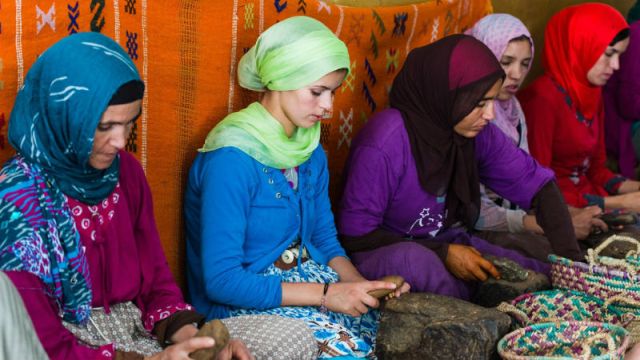
Breaking barriers: Moroccan women take a professional leap
By Jaideep Sarin,
Dakhla (Morocco) : The stereotype of an African-Arab Muslim nation, where women are expected to be seen covered from head to toe and not given prominence in public and social life, is being broken by progressive Moroccan women who are actively taking up positions in various spheres and professions, particularly the media, that require dealing with the public.
At the Crans Montana Forum (CMF) conference in this Western Sahara city of Dakhla, women may not outnumber men, but they marked their presence in every area — be it among the organisers of the conference, attending to delegates from the host country and other participating nations or even in covering the event. Clear evidence of a liberalised Moroccan society.
“Moroccan women are taking up a lot of professional roles, including a growing number in journalism. In media organisations, the number of women on the staff is almost equal to or even more than men. Many of them, especially the younger generation, are doing well as professionals,” Kawtar Wakil, a young Moroccan woman journalist, told this visiting IANS correspondent on the sidelines of the Crans Montana Forum conference here.
Wakil, who is now based in Lyon in France and works with EuroNews TV channel, is here to do stories on the Forum and interview the dignitaries who are attending.
“I have interviewed the Moroccan Prime Minister, ministers and dignitaries from other countries and some prominent figures attending the conference. I love the job that I am doing,” said Wakil, who studied journalism and French law in Casablanca and has been a journalist for eight years.
Having started with a media production house, Wakil is now a Duty Editor in the TV channel in France and manages a team. She had earlier worked for six years, covering sports, in Morocco, a country with multi-cultural influences that abuts the Atlantic Ocean and Mediterranean Sea.
“In media organisations in Morocco, more women can be seen picking up jobs. At times, male colleagues are jealous of women but that is part of any profession. Women are doing well in public life in Morocco and get a lot of respect,” she said, adding that her father had earlier refused to allow her to become a journalist when she told her family about her intentions.
“Now everyone is happy,” she said with a dimpled smile on her beautiful face.
Kauotar Dahdouh, 29, who is married and has a lovely one-year-old daughter, had to “squeeze in” time during her hectic work at the CMF to talk to IANS. She said that she was quite happy and comfortable in her professional role at a journalist and TV presenter.
Working with the Medi1 TV channel in Morocco and based in Casablanca, the country’s financial capital, Kauotar manages to balance her role in the profession and her family.
“Moroccan girls are very intelligent, independent and proud. I like this. There is a lot of respect for women in Morocco. I was offered a job when I was doing internship during my journalism studies,” said Kauotar, who covers politics, economy and almost everything else, including the Rallye Aicha Des Gazelles motor rally.
At the CMF venue, scores of women, especially young ones dressed professionally, have their hands full dealing with over 3,500 delegates attending the conference.
“These are hectic days for us but we are enjoying the experience here as it is a big international event,” a young woman, who is pursuing a course in tourism management in Morocco, who did not wish to be named, said at the CMF village venue. Her friend, who spoke in Arabic and French, nodded in approval.
Moroccan women like Radio journalist Ilham Khalif entered the profession much earlier.
“At that time, the number of women was less in journalism. Now women are almost equal in numbers in most organisations and doing well,” Khalif, who has been working for 15 years, said.
(Jaideep Sarin, Editor-North with IANS, is in Morocco on the invitation of the Crans Montana Forum. He can be contacted on jaideep.s@ians.in )
—IANS
